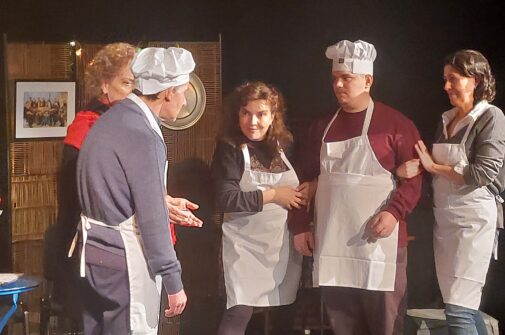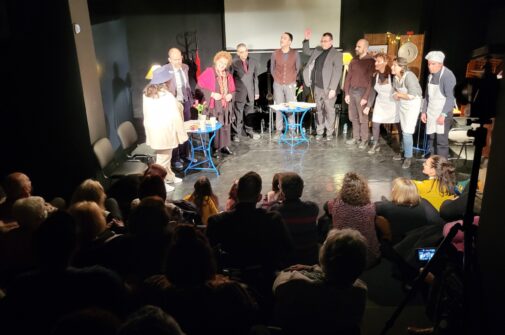The final show of the Stage of Mind project in Athens could be described as an “authentic experience in a professional context”. The title of the play was the “Café of the Shy People”, a common meeting point in a neighborhood of “common” people, in which conversations on every-day life take place… But, on the afternoon of a rainy Sunday in this café, they will unravel a hidden story and will discover the depth of human loneliness together with the power of human communication when it blossoms in acceptance, respect and joy. The story of this performance was created through devising techniques and using the tools extracted by the training units of the Stage of Mind program, and it is a collective work. The group of participants-actors was highly inclusive, as it consisted of 7 participants of the Stage of Mind program who held the main roles, 4 co-facilitators who held assistant roles of musicians/ “waitresses” of the café in which all action took place, and one volunteer who also held a role on the plot of the show.

The two performances took place at the Panhellenic Union for Rehabilitation of People with Mental Illness theatre in central Athens. In order to facilitate the adjustment to the needs of performing in front of a live audience, we also gave an open dress rehearsal in front of almost 60 people. We have to mention that the audiences’ reactions were highly enthusiastic and their comments described a moving artistic experience. The audience that flooded the packed theater laughed to tears and cried to tears. They sang along with the “shy people” and shared their charge and their own emotion. The inclusive power of theater art and creation once again worked redemptively.
In terms of memorizing their text/actions, all participants managed to perform as scheduled, and they also communicated with the audience in their own authentic way, either with highly amusing improvised interaction, or with their unique physical presence and temperament. On the day of the second performance, one of the protagonists arrived at the theatre with a two-hour delay, due to the general strike taking place in Athens on that day, but all members reacted to this unexpected incident with sobriety and solidarity.
Regarding the qualitative characteristics of the experience, the participants approached the artistic endeavor with a rare and unique sincerity and honesty thus succeeding in offering a poetic experience to the audience. During the training workshops all participants faced intense insecurities, fears and doubts but at last the group managed to captivate and move its audience. During the performance the participants played with confidence and managed to overcome the difficulties experienced at the training and the rehearsals. This creative process revealed their inner strengths and showed them that on the stage they can share common feelings, anxieties, and emotions with the audience.

It is difficult to define the extent and quality of this experience for the participants of the show. Some of them did not leave the theatre after the performance. They stayed and talked to the audience while others left immediately after the show accompanied by their families. Some days later we reflected on the show in a team conversation, in which all participants evaluated the high quality of the experience, but some mentioned that their stress does not allow them to repeat it, at least not immediately.
Stage of Mind has ended, but its echo and imprint remain deeply engraved on its creators, the people with psychosocial problems, who felt their cognitive abilities and confidence strengthened and a sense of belonging to a working group for a common purpose and committing to it and most importantly becoming the protagonists of their own life by directing it and presenting outwardly all the inner beauty and strength they carry.
The main conclusion regarding the final show-implementation of the Stage of Mind project- could be summarized in the following premise, in which both teams of mental health service users and art experts agree: the biggest challenge is to help participants realize that their contact with the world can be poetic, as it was during the experience of the performances. All spectators of the show in Athens witnessed this poetic experience with tears of joy and emotion. It seems that a pathway of “poetic inclusion” is already crafted and is open to keep walking on it.
